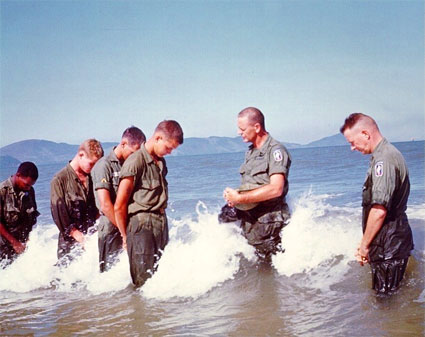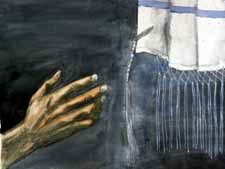Dec
15
2009
Blood Shed for Bloodshedders

“Now thanks be to God who always leads us in triumph in Christ, and through us diffuses the fragrance of His knowledge in every place. For we are to God the fragrance of Christ among those who are being saved and among those who are perishing. To the one we are the aroma of death leading to death, and to the other the aroma of life leading to life.” 2 Cor. 2:14-16
For those who questioned whether the image of Day 5′s swarms corresponds to the clouds of incense as armies of God, Paul himself does it in 2 Corinthians 2.[1] The saints are soldiers who wield the two-edged sword of the gospel. It brings both life and death, depending on whether those warned respond like Rahab or not. Which brings me to my point.
Doug Wilson recently posted about the sacraments being promises of salvation.
“Every sacrament, by definition, contains and manifests a promise of salvation. That is what a sacrament is. The sacrament of baptism contains a promise of salvation at its inception, and the Supper contains a promise of salvation related to perseverance. What God began God will complete. These promises are apprehended with the heart, whenever someone receives them in faith.”
There is much he wrote that I agree with, but what he said highlighted the major difference between paedo- and credobaptism. Here’s my response for what it’s worth. It does repeat some things I have posted elsewhere here, but it might make my position clearer to some, and the reasons for it. It’s not an argument I’ve seen used by credobaptists, so it might be of interest to you. Continue reading
3 comments | tags: Baptism, Doug Wilson, Joshua, Systematic typology | posted in Biblical Theology
Nov
28
2009

or Drive-By Typology
——————————————————————————-
Rome has this whole nutty Oedipus thing going. They want the infantile security of Mary’s breast when God calls them to grow up, to be as individuals men worthy of a bride’s affections, and corporately a bride who adores only her Husband!
——————————————————————————-
Verifying typological connections is a tricky business. Like driving, it is not a skill but an art. This means that although there are certain rules to follow, above all of that there are situations where being steeped in the types and structures of the Bible is the only way to proceed with wisdom. James Jordan recently commented that any such exegesis should be carried out within the conversation of the church, and:
“The popular notion that everyone should be able to read and exegete the Bible equally, as a result of learning some so-called “science” of hermeneutics, is about as stupid as thinking everyone can write music like Bach and Beethoven by studying the rules of harmony and counterpoint; or that anyone can be a Shakespeare.”
I’m no Shakespeare, but James Jordan’s identification of the biblical “universals” and an explanation of biblical types has helped me enormously. The Bible matrix structure has also helped me enormously. They are typological “systematics.” It is this kind of grounding, like practising scales on a piano, that enables us to more easily identify abuses of typology — such as the claim that Mary is a “New Eve.” Dischordant notes can be used to great effect in great music, but it takes a practised musician to know when it is within a greater “harmony” and when it is not. This is beyond the basic scales.
Continue reading
5 comments | tags: Athaliah, Baptism, Bible Matrix, Hermeneutics, James Jordan, Mary, Peter Leithart, Roman Catholicism, Systematic typology, Totus Christus | posted in Biblical Theology
Nov
24
2009

There was a discussion of purgatory on the BH list. Someone summarised it as follows: [1]
“Or, perhaps, with Peter Kreeft, one might interpret purgatorial cleansing as a form of heightened and perfected awareness, effected by the light of God’s presence as an illuminating and purifying fire. Thus, in death, in coming face-to-face with God, we finally see ourselves as we truly are, the depths of our own sin and brokenness, and all the consequences and ruin wrought by our own sin and unfaithfulness in our own lives, the lives of others, and the ongoing life of our family, church, and world.
Continue reading
Comments Off | tags: Atonement, Azal, Baptism, Communion, Crystal Sea, Laver, Purgatory, Roman Catholicism | posted in Biblical Theology, Quotes
Nov
23
2009
Under the title Baptism working against you…, my Presbyterian friend Uri Brito wrote:
“Reprobation is a real theological and biblical idea. It is directly related to the idea of apostasy. Apostasy is a real theological and biblical idea. It is directly related to baptism. In baptism, apostates find their worst nightmare. It is better to be baptized by a cult (which is an invalid baptism to begin with) than to be baptized by an orthodox Trinitarian church. The problem for the apostate with the latter baptism, is that they incur the full wrath of the waters. As Leithart writes: ‘Their baptisms are effective in being witnesses against them.’ Baptized apostates will receive what the Egyptian army received.”
How can an involuntary baptism be a witness against anyone? If I am in a coma for some reason on my wedding day and the best man has to make the vows for me, what sort of case are the witnesses going to have if I break those vows because I feel like I have woken up with Leah instead of Rachel?
Continue reading
6 comments | tags: Baptism, Federal Vision, Uri Brito | posted in Biblical Theology, Christian Life
Sep
28
2009
or There Is No Conscription In Christianity, So Stop Picturing It.

I’m not opposed to apparently weird and wonderful ideas from the Bible (anyone who visits this blog knows that), as long as they can be backed up repeatedly from Scripture. This is inevitably typological, and this is why I take issue with infant baptism. As I have written elsewhere here, the entire Old Testament typological freight train is against it, but I just want to hammer one point here, and I have a silver hammer.
Continue reading
11 comments | tags: Baptism, Bible Matrix, Daniel, Esther, Federal Vision, Totus Christus, Typology | posted in Biblical Theology, Christian Life, The Last Days, The Restoration Era
Sep
25
2009

Today we had our final “Scripture” class at the high school for this term. After a summary of the term’s lessons and a final gospel presentation, students were asked to fill out a form and tick some boxes. It was encouraging to see how many students ticked the “I made a decision for God today” box (or words to that effect). And which kids tick that box is always very surprising. God is at work.
Which left us to decide what to do next term. We can’t just do the basics again (and believe me, the lessons we are doing now are kindy stuff). I suggested we challenge those who made decisions to join a church and get baptized. Look of horror from the Anglican teacher.
Continue reading
2 comments | tags: Baptism, Bible Matrix, Federal Vision, Gnosticism, Laver, Revelation | posted in Christian Life
Sep
24
2009

“According to I Chronicles chapter 15, 16:4-6, 37-43, David rearranged the Levitical priesthood into 24 courses (orders); he assigned 16 courses to Eleazer, and 8 courses to Ithamar. This rearrangement was chartered because of a population explosion in David’s reign.” [1]
More evidence for a human government installed in heaven in AD70 (the firstfruits church). If the rebuilt Tabernacle (the Tabernacle of David [2]) prefigured both the restoration of the Jews after the captivity (which is what Amos is actually referring to) and the Jew-Gentile church, what could David’s rearranged priesthood mean typologically?
Continue reading
Comments Off | tags: AD70, Against Hyperpreterism, Amos, Baptism, Bible Matrix, Feasts, Firstfruits, Jericho, New Jerusalem, Revelation, Tabernacle, Tabernacles | posted in Against Hyperpreterism, Biblical Theology, The Last Days, The Restoration Era, Totus Christus
Aug
16
2009

How serious is it to say to a regenerate person: “You are not permitted to be a member of this church”?
If you haven’t heard John Piper’s sermons on the importance of baptism and church membership last year, do yourself a favour.
Frank Turk does have an issue with one point, however, which I repost here with his permission:
. . . . . . . . . . . . . . . . . . . . . . . . . .
Dr. Piper opens up the can of worms at his church again by beginning a series on baptism and church membership. The long-time readers of this blog know for a fact that this topic is near to me and dear to me — because it’s one of the topics I have blogged about most often. And in that, I think I am more a Baptist for it today than I was 3 years ago.
Continue reading
6 comments | tags: Baptism, Frank Turk, John Piper | posted in Christian Life, Quotes
Jul
29
2009
Or Old Covenant baptism
“The LORD said to Moses, “Speak to the Israelites and say to them: ‘Throughout the generations to come you are to make tassels on the corners of your garments, with a blue cord on each tassel. You will have these tassels to look at and so you will remember all the commands of the LORD, that you may obey them and not prostitute yourselves by going after the lusts of your own hearts and eyes.” Numbers 15:38-39
 Every Israelite was to wear a robe with four blue tassels. The Hebrew word for tassel is the same as for wing. Israel, as mediator-nation between heaven and earth, flew about in the air between heaven and the abyss. Malachi prophesied that the Messiah, the Sun of righteousness would come with healing in His wings, or, healing in His tassels. The four blue reminders of the letter of the Law would no longer bring death, but life.
Every Israelite was to wear a robe with four blue tassels. The Hebrew word for tassel is the same as for wing. Israel, as mediator-nation between heaven and earth, flew about in the air between heaven and the abyss. Malachi prophesied that the Messiah, the Sun of righteousness would come with healing in His wings, or, healing in His tassels. The four blue reminders of the letter of the Law would no longer bring death, but life.
The sick woman in Matthew 9 touched the hem of His robe and was healed of a disease that made her ceremonially unclean (see also Matt. 14:36; Mark 6:56). She had touched the curtain of a new Tabernacle and her sin was identified with Him instead of with her. The flow of blood (death-by-Torah) was stopped, and a flow of cleansing water was begun. We have to take things a little deeper to get the full picture.
Continue reading
Comments Off | tags: Baptism, Circumcision, Tabernacle | posted in Biblical Theology
Jul
12
2009
More on baptism (sorry). Douglas Wilson writes:
“You could even say that this is one of the differences between presbies and baptists — all Christians of course believe in “covenant baptism,” but for the baptists the relationship is between the individual being baptized and the covenant itself, Christ Himself — that’s what makes it a covenant baptism. But for the presbie, other people are involved.”
Good observation. But surely this is a contrast between good presbie practice and an error baptists are only prone to?
Continue reading
Comments Off | tags: Baptism, Doug Wilson | posted in Biblical Theology, Christian Life, Quotes

































